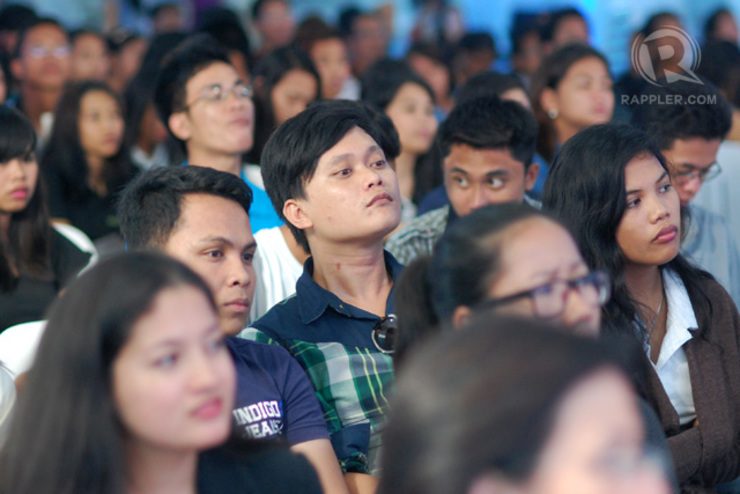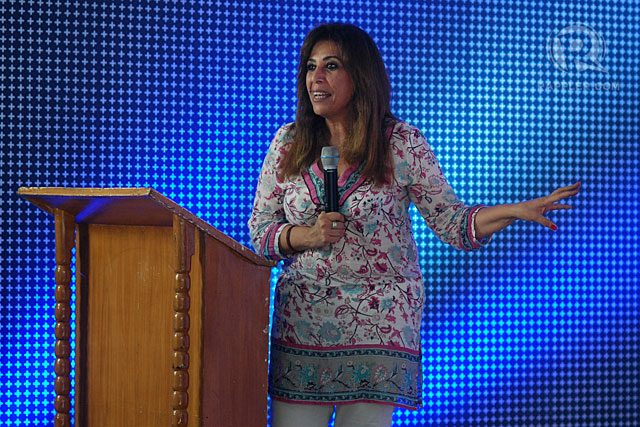SUMMARY
This is AI generated summarization, which may have errors. For context, always refer to the full article.

TACLOBAN CITY, Philippines – It was the morning of November 8, 2013, and radio reporter Fred Padernos was restless. It was 6 am and the city was pitch-black. The wind was fierce, the rain relentless.
But it was not the time to fret. From 6 am to around an hour later when the cell phone signal in the city shut down, Padernos was busy calling mayors of the different towns in Eastern Samar.
“That’s what we do. When there’s a typhoon, an earthquake, war, we should be there,” Padernos told Rappler on September 19, 2014 on the sidelines of the 2014 PH+SocialGood: Tacloban Journalism Forum.
Jen Manriquez, a journalist and member of the The Peace & Conflict Journalism Network (Pecojon) Philippines, agrees. During the forum, she told a crowd of students, journalists, and workers of non-governmental organizations that local journalists play a special role in times of disaster and conflict.
When disaster strikes
In the aftermath of Yolanda (Haiyan), the world’s worst typhoon, local journalists gathered in the city’s grandstand. With their equipment gone and offices in ruin, they had no choice but to go old-school: piecing together any verified information that came along their way and posting it on a bulletin board. (READ: ‘Radio from Tacloban, for Tacloban’)
It wasn’t easy. Many journalists were victims of the typhoon themselves. Their colleagues were among the thousands killed by Yolanda. (READ: ‘Until the end, Tacloban journalists did job’)
“[Local journalists] know the language, they know the culture, we know the local situation, we know how to get to one place to another,” she said.

And it’s the local journalists who stay and live the stories of relief and recovery. Manriquez said reporting was one way for local journalists to help in the aftermath of the storm.
“Communication, reporting was their form of aid,” she added.
But it isn’t easy. Local media groups are seldom paid decently. One local reporter in the audience said during the open forum that pay often leaves them wanting. In some towns, reporters are only paid P75 (barely $2) for every story they file.
That’s where a good network of journalists worldwide can help, said Cairo-based journalist Shahira Amin, who was one of the speakers at Friday’s journalism forum. Amin in 2011 resigned from her “dream job” as senior anchor and deputy head of state-owned Nile TV at the height of the Tahrir Square protests.
Community support
Manriquez said that while international and national journalists can do a good job in documenting and reporting on a disaster, they usually do so for communities outside the ones affected. (READ: World media in PH; Cooper slams slow Haiyan response)
Matters that are not breaking news or human interest pieces – such as which non-governmental organizations are legitimate and trustworthy, or where locals can get the support they need – are what many local journalists pursue because they live in the community.
“The only way that the people can actually participate is when journalists give them quality information, quality journalism. If journalists don’t give them the right information, how can we chose the right leaders?” said Manriquez.
But Manriquez said the community also needs to give back. For instance, a community can ensure a free and independent press by paying for local content, and supporting local media organizations.
It’s also a challenge for the community to be critical of its “watchdogs.”
“We cannot be effective if we are not accountable. We cannot be accountable if people do not demand for us to be transparent,” added Manriquez.
‘Traditional’ to ‘humanitarian’
Padernos now works as the station manager of Radyo Abante. His hometown for most of his life is slowly going back to normal.

The veteran journalist said Yolanda forever changed the way he views his job – from a “traditional journalist,” he and his colleagues now consider themselves “humanitarian journalists.”
“Before it was the mayor, vice mayor, congressman, councilor that you talk to. Now you go to the most far-flung barangays, you enter the tiniest of walkways just to speak to the people,” he said. When they visit some communities, they get a warm welcome from residents. “When we visit them, they’re happy because through us they express their needs, their worries, their problems,” said
It doesn’t mean the job is easier, but that’s not what journalists – international, national, or local – are looking for.
“It has to be a life mission. Your heart has to be in it. If not, find a different job,” said Amin. – Rappler.com
Rappler kicked off the third of 4 all-day think-sessions about what technology and the future hold for us. The forum was organized with Microsoft, the Global Center for Journalism and Democracy, AC Communications and IP Star, Friedrich Naumann Foundation, International Organization for Migration, and World Vision Development Foundation.
On Saturday, September 20, Rappler will hold PH+SocialGood: Tacloban #2030NOW. Watch it live on the site homepage.
Add a comment
How does this make you feel?
There are no comments yet. Add your comment to start the conversation.